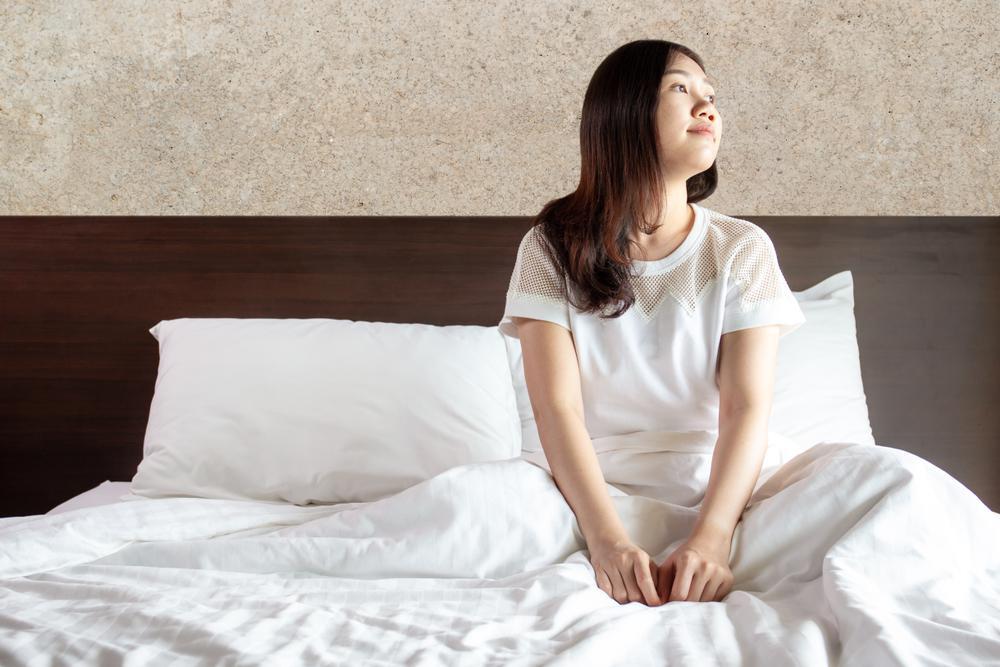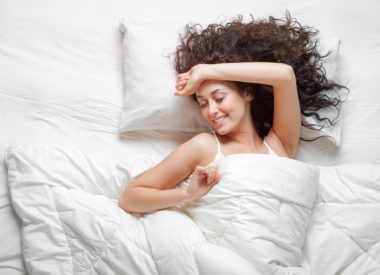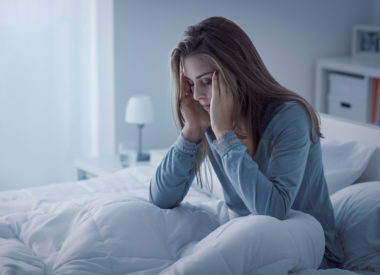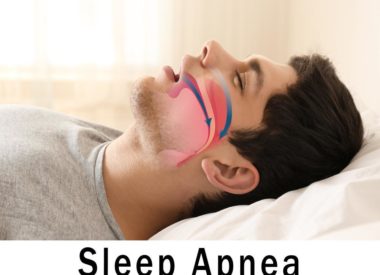How to practice good sleep hygiene: Tips & Tricks
If you regularly practice these habits, you are “practicing good sleep hygiene.”
Despite what the term implies, sleep hygiene is not just about showering before bedtime or changing out your sheets more frequently. It means that you are making decisions or taking actions throughout the day and into the night which positively improves your chances of sleeping better.
Does practicing good sleep hygiene work? For people with no underlying sleep disorders, but who still have problems with sleep that can’t be attributed to other health conditions, the answer is yes.
Sometimes we do things during the day that sabotage our sleep. Sleep hygiene, like dental hygiene, is a preventive measure that has the added benefit of making us feel better overall with just a little added mindfulness.
Sleep hygiene practices include not only activities and behaviors related to bedtime, but also to choices we make during the day which can profoundly impact our nighttime sleep.
The sleeping process actually consists of two elements: sleep and wakefulness. Without sleep, you can’t stay awake. And if you are awake all the time, this obviously influences the quality and quantity of your sleep. Ideally, you are awake while the sun is up, and you are asleep when the sun is down.
This is no coincidence: all living beings have rhythms that match with or are entrained to, the Earth’s cycles as it revolves around the sun. You circadian rhythms are the foundation of good health; they require you to have both periods of sleep and of wakefulness in order to function.
Daytime sleep hygiene considerations
Here are a few things to consider about your activities of daily living which can have a powerful influence on your ability to sleep at night.
- Naps. If you nap for several hours every single day, you may suffer from an undiagnosed health condition. What’s more, your ability to fall asleep at night works in direct proportion to how long you have been awake prior to your last sleeping period. If you have a two-hour, late-afternoon nap, it’s going to take longer for you to fall asleep at your normal bedtime.
- Exercise. A brisk workout right before bedtime generates a flood of stress hormones, including adrenaline, into the system; it takes a while for your body to “come down” from this rush. Delayed sleep onset can result from jogs or gym sessions that happen after dinner.
- Light exposure. If you wake up to darkness, you could feel groggy for much of the day. Early exposure to natural light is crucial for supporting the circadian system as it sets your rhythms for the day. People in the Pacific Northwest and across the northern latitudes, in general, are short-changed light exposure during the winter; this can lead to health issues even beyond the realm of sleep.
- Waking routine. Sleeping in may be useful, from time to time, to overcome any residual sleep debt you might have, but late rise times over each and every weekend can actually reset your rhythms, making it very difficult for you to get up on Monday mornings. This measurable phenomenon is called “social jet lag” and explains why many people feel so exhausted on the first day of the workweek.
- Stimulant foods. Coffee, cocoa, chocolate, caffeinated sodas, or teas may temporarily help with morning “fogginess,” but keep in mind: these products can be diuretic in nature. If you don’t replace lost fluids after each serving, your morning “pick me up” can turn into an afternoon slump that leads to more consumption after lunch, setting you up for problems with sleep later that night.
- Drugs of all kinds. Whether they are over-the-counter medications, prescriptions, nutritional supplements, vitamins, legal recreational drugs, or illicit controlled substances doesn’t matter: side effects from using any of these during the day can be problematic for sleep. Mixing them can lead to undesirable drug interactions that also affect sleep onset and quality.
Nighttime sleep hygiene considerations
The habits and behaviors we practice at bedtime also influence sleep quality and quantity:
- An unquiet mind. If you struggled to “turn off” the noise of the day that has collected in your mind, you will struggle to fall asleep. Stress, anxiety, depression, information overload, media fatigue: if you don’t find ways to cope with these challenges, poor sleep will result.
- Lack of a bedtime routine. The idea behind a routine is that it is simple and easy to follow. If your bedtime is chaotic and unpredictable, or if you go to bed at different times every night of the week, you will find it difficult to unwind without a routine already in place.
- Lights out! A nightlight in the bathroom for safety is fine, but leaving lights on in the house, or dealing with intrusive light coming in from outside your bedroom window, is going to make it hard for you to sleep.
- Electronics. Back-lit electronic screens have become a ubiquitous part of the household. That does not mean they should go to bed with us! These devices all emit blue spectrum light. Your brain, once the sun goes down, begins to prepare for sleep by releasing gradually increasing amounts of melatonin. This hormone is critical for promoting and maintaining sleep. Blue spectrum light sends a signal through the eyes to the brain to cease melatonin production. In the hour before you go to bed, if you are checking your cell phone, playing a handheld electronic game, reading a book on your pad, checking email on your computer or watching a movie on a portable device, you are exposing your eyes to blue spectrum light and telling your brain to stop producing melatonin.No wonder you can’t sleep!
- Room temperature. A stuffy, over warm room can make it hard to fall asleep; the body’s core temperature needs to drop in order for sleep to take place. The warm air that’s not regularly refreshed also loses its quality.
- Noise. Everyone is different: some people need complete silence to sleep, while others like to hear the lulling rhythm of street traffic from below their apartment building or the cricket orchestra in the backfield. However, random unexplainable noises (from loud neighbors or people elsewhere in the house who are still awake) can keep you up all night. What’s more, people who sleep with snorers can suffer terribly from fragmented sleep as a result.
- Bedding. Lumpy pillows, sunken mattresses, threadbare sheets, scratchy blankets, and any kind of bedding that is unclean or causes allergies needs to be replaced. Your comfort is critical to good sleep. Also, choosing a proper sleeping place is important. A couch is not going to be as good as a bed, but a recliner might be of better service for some people.
- Pets and children. As much as we love them, pets and children can also be noisy, physically active, or otherwise distracting at night.
- Sleep aids. Using medications for sleep does not actually identify the reasons why you struggle to fall or to stay asleep. Most are not meant to be used in the long term and have serious side effects as well. They can also depress the respiratory system and worsen any underlying problems you may have with breathing as you sleep.
- Food. Too much food eaten too late at night can result in heartburn or reflux, which is well known for interrupting sleep. Spicy or rich fatty food gives the digestive system a lot of extra work to do before you retire for the night. Our digestive systems have their own set of rhythms and, by and large, they are not built to be active during the late hours. Going to bed hungry is not a good idea, either.
- Alcohol has long been thought to be a great way to induce sleep, hence the notion of the “nightcap” cocktail. While a drink or two at bedtime may help you fall asleep, it will lead to broken sleep once the body has metabolized the alcohol. This leads to a “withdrawal” response that messes with sleep architecture. Drinking before bedtime also means more nocturnal awakenings to use the bathroom. Finally, if you have an undiagnosed sleep-breathing disorder, alcohol can easily increase the severity of your condition.
- Smoking. Smokers tend to have a cigarette or “vape” before bed because they insist in relaxes them. And in part, they are right: smoking does tend to take the edge off nerves. However, the body responds to the nicotine as if it were a stimulant, so ultimately, any relaxation that comes of it is canceled out. Smoking also contributes to sleep-breathing disorders and overall poor health and should be avoided.
- Marijuana use. Like cigarette smokers, those who use marijuana also count on the drug to relax them. However, studies are still largely inconclusive as to the benefits of marijuana for achieving quality sleep. The differences between the varieties of marijuana and the way it is consumed affect sleep architecture as well. More evidence-based science is required before conclusions about its use as a sleep aid can be made.
Some of these considerations may be easy to manage. But others? It may be hard to kick a late habit after 3 p.m., or you may not want to get up earlier on the weekend, and quitting smoking is never easy. But those who have overcome these habits often report improvements in both sleep and overall health as a result. If you want to improve your ability to fall asleep at night and to get quality sleep, any or all of these tips can help you achieve these goals, if you are willing to give them a try.
Good sleep hygiene practices
Here are some tips and techniques for getting a better night’s sleep:
- Nap mindfully. Short naps earlier in the day are better than long naps later in the afternoon.
- Exercise while it’s light out. The earlier, the better. Exercise during the day increases metabolism and helps keep you feeling alert during the day. It is also helpful for increasing muscle and tissue tone (including in the upper airway), improving mood, and supporting weight loss.
- See the light (in the morning). As soon as you wake up, get a solid dose of natural light. Your circadian system will thank you later!
- Block the light (at night). Room darkening shades work well for keeping out external light pollution, and silk eye masks are not only effective but quickly returning as a fashion accessory. Your circadian rhythms require darkness at night.
- Pick a sleep schedule and stick to it. Granted, real life doesn’t always allow for this, but the more disciplined about your sleep health you are, the better your sleep will be.
- Avoid caffeine after lunch. If you struggle to fall asleep at night and have a penchant for late-day coffee or chocolate for dessert, these might be the culprits.
- Review your medications. Together with your physician and your pharmacist, you can ask for a regular review of medications, nutritional supplements, and other substances you may be taking to help identify any unintended consequences they may bear on your sleep health.
- Relax! There are many techniques you can try to achieve relaxation. They can be a regular, and pleasurable, strategy for preparing for bed. A warm bath, listening to soft music, reading, meditation, yoga, and deep breathing are just a few ways to prepare your mind and body for a night of sleep. A bedside journal for recording thoughts, worries, or gratitudes can help “shut down” the mind.
- Get into a routine. Just the act of following the same pattern of behavior every night (brushing your teeth, washing your face, stretching, plumping the pillows, etc.) and every morning (getting out of bed rather than managing the snooze alarm) can help you achieve better sleep that leaves you rested and refreshed.
- Put away your electronics. Not only does the blue spectrum light they emit cause your brain to stop releasing melatonin, which promotes and maintains the sleep cycle, but the content of your electronics can be stimulating, even stressful, making it difficult to shut down the mind and relax. If you must use them (it’s part of your job, for instance), there are screen filter accessories, light filtering software, and blue-blocking lenses you can use to prevent your eyes from taken in a load of blue spectrum light.
- Keep it cool. If you like to be cozy, you can keep the room thermostat low but add layers of blankets to stay warm. Fresh, cool air from a cracked window also helps to improve the air quality, which can impact how well you breathe at night.
- Silence is golden. A simple pair of earplugs can take care of most noise concerns. Others like the hypnotic quality of white-noise machines. If silence is too “golden” for you, listening to soft, relaxing music can help.
- Bedding matters. Pillows, mattresses, sheets, and blankets should be clean, comfortable, and supportive. Pillows should support the head and neck and shouldn’t interfere with breathing. Mattresses need to be replaced every decade or so. Clean, fresh sheets make for a pleasant to start to the night; even making your bed in the morning makes it more inviting at night. Finally, people with allergies should take special care when buying linens, bedding, and pillows.
- Let go of time. If you are constantly checking the time on your clock or phone, remove them entirely from the bedroom. Placing them in your bathroom still works if you need to have a phone line nearby for emergencies or an alarm to wake you up.
- Sleep solo. Pets and children may be better off sleeping elsewhere if they constantly interrupt your sleep. Some spouses report that separate bedrooms work for them as well when one or the other snores.
- Snack wisely. Some foods have been shown to improve your chances of falling asleep, such as light carbohydrate snacks or warm milk. Lighter meals, when you know you will be eating late, can help prevent heartburn.
A final word about getting a better night’s sleep
Why sleep hygiene matters:
- It’s inexpensive. Most of these problems have free or inexpensive solutions. If you can’t afford light-blocking shades in your bedroom, you can still afford an eye mask, for instance.
- It’s easy to practice… as long as you are willing to try! Quitting smoking or changing your meal schedule may be a little harder to achieve, but both efforts will reward you with much better health.
- Simple solutions are often the best. A pair of earplugs can immediately improve sleep for someone whose partner snores. Getting up at the same time every morning and going to bed at the same time every night quickly resets and maintains your circadian rhythms. Simple breathing techniques can show results for insomniacs even after the first night.
- The Big Picture. Your self-awareness of bad sleep hygiene is the first step to better overall health. After all, if you sleep better, you live better. Your health improves in every area if your body and brain are well-rested.
- You’ll feel better! Reclaiming a healthy sleep schedule just feels better! You don’t have to be a victim of poor habits. You can take one problem area at a time, work it through, and keep going. Taking charge of your sleep habits is one of the nicest kindnesses you can pay yourself.
You may already have pretty good habits, which is fantastic. However, keep in mind that sleep hygiene does not address underlying sleep health problems. If you suspect your sleep problems are beyond your ability to improve your sleep habits, for instance, you struggle to breathe well at night or have pounding headaches all night long or other issues with pain or discomfort it is critical you consult your physician about the possibility that your sleep problems have medical foundations that need identification, diagnosis, and treatment.
Please reach out to us at Sound Sleep Health. We have 3 locations in the greater Seattle/Kirkland areas. Call us and Improve Your Sleep Today!



